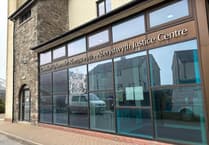QUIET in the hills above Aberystwyth until a sideways jet grazes a nearby hilltop and as though heralding the end of days, the awesome howl of afterburners overwhelms the Ystwyth Valley. We never get used to treetop-hugging jets. I step outside, await the wingman and seconds later the valley is again filled with the scream of military aircraft.
I typically wonder whether any other gainful employment might be more thrilling than chasing co-workers around mid-Wales in jet fighters, but today I think of Anton.
An hour ago, Anton tells me that he needs to take up his unfamiliar automatic rifle, spend another 12 hours in thick snow behind six-foot breezeblock barricades awaiting the Russian army. I wonder how Anton reacts to the approaching roar of fighter aircraft. I venture my friend neither steps outside in slippers, nor gawps up at the spectacle and waves, not in central Ukraine. I worry what will happen if Anton remains in Ukraine, as is his intention. Troubling to imagine, so I consider the alternative.
What will happen if Anton becomes part of the fastest-growing refugee crisis in Europe since World War Two? What if, as predicted, tens or hundreds of thousands of Ukrainians flee to these shores? And if hundreds of Ukrainians arrive in Mid-Wales? What then? This eventuality is simpler to imagine.
Some good news for Anton and his compatriots is that they will not be referred to as asylum seekers, not yet. These folk have been classed as refugees and as such will be widely welcomed. This is what we do.
But, however progressive this well-intentioned sense of our own community may be, we should take care that routine deployment of alienating language does not render a different reality. For instance, as more and more refugees settle, the influx will be described as the ‘Ukrainian community’ and in doing so identify the newcomers as something apart.
But these Ukrainians will live among us, with us, will be employed alongside us across the public sector, industry, hospitality and retail, set up businesses, and as such absorbed within local communities, regional communities, and the Welsh community.
Yet we have made a virtue of assigning people who are different, or from somewhere else, to nonexistent communities. To pick a few examples, we refer to a fictitious Black community, the disparate LGBTQI+(A) community, the multinational Muslim community, and a disabled community so broad in scope as to be meaningless.
Recently, ridiculously, and most dangerously, in identifying a BAME community we suggest the entire non-white population may be usefully viewed as a distinct faction, rather than the myriad experiences and viewpoints represented by people of colour. Yet we reinforce this concept of separate communities by amplifying the voices of often self-elected (and often self-interested) ‘community leaders’.
At best, imposing arbitrary ‘communities’ serves to divide ‘them’ from us, and us from ‘them’.
At worst, prescribing outsider labels installs a collective responsibility upon a group of otherwise unconnected individuals. In effect, when one member of a ‘community’ veers, it becomes easier, even intuitive to hold the whole ‘community’ accountable.
It is what we do.
So, when our intention is to imbue our multi-faceted society with a more inclusive atmosphere, we might choose language that does not instantly marginalise.
We may imply that living differently, or being a minority, or from somewhere else, does not place an individual into a separate community. And we achieve this, when we need to, by referring to black and brown members of our community, gay and lesbian members of our community, and in due course, Ukrainian members of our community.




.png?width=209&height=140&crop=209:145,smart&quality=75)
Comments
This article has no comments yet. Be the first to leave a comment.